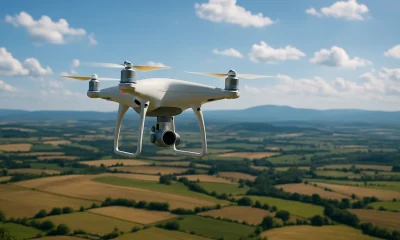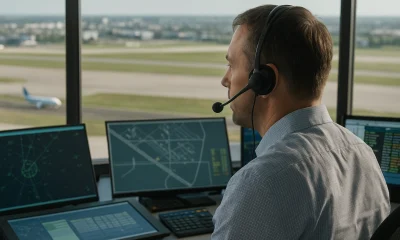- Acronym Guide
- AAM
- ABS
- AC
- ACAS
- ADS-B
- AEHF
- AFAC
- AGL
- AI
- AIM
- ALPA
- ALS
- AM
- AMA
- ANSP
- AOI
- APPI
- AUV
- AUVSI
- ARPAS-UK
- ASTM
- ATC
- ATO
- BLOS
- BVLOS
- CAA
- CAAC
- CAB
- CAP
- CASA
- CATT
- CBO
- CBR
- CBRN
- CDMA
- CDR
- CFI
- CFR
- CIR
- COA
- COMINT
- CORS
- COTP
- COTR
- CPTED
- CV
- C2
- DAA
- DAS
- DEM
- DFI
- DFS
- DGCA
- DHS
- DOD
- DPA
- DPEs
- DRG
- DRO
- DSM
- DSMX
- DSP
- DSSS
- DTM
- EASA
- EFT
- EO
- EOD
- EO/IR
- ELINT
- EMI
- ESC
- EVLOS
- eVTOLs
- FAA
- FCC
- FCS
- FHSS
- FICCI
- FLIR
- FOB
- FOV
- FPS
- FPV
- GBDAA
- GCP
- GCS
- GDPR
- GML
- GNSS
- GPS
- GSD
- GVC
- HDR
- HOGE
- IACRA
- ICAO
- ICS
- IED
- IMU
- INS
- IR
- ISA
- ISR
- ITU
- JARUS
- LAAMS
- LAANC
- LAATM
- LAI
- LAS
- LBA
- LIDAR
- LOS
- LSALT
- MAC
- MAVLink
- MLIT
- MMS
- MSL
- MTOM
- NDAA
- NCSL
- NFZ
- NIST
- NMEA
- NOTAM
- NPA
- NPRM
- NTIA
- OBIA
- OEM
- OFDM
- OGI
- OOP
- PAS
- PASM
- PAV
- PCV
- PdM
- PEC
- PIC
- PID
- PIPL
- PLD
- PM
- PN
- PPK
- PPS
- PSM
- PTZ
- PWM
- UAM
- UAOP
- UAS
- UASTM
- UAV
- UCAVs
- UHD
- UHF
- USV
- UTM
- RAIM
- RCC
- RCS
- RED
- ReOC
- RePL
- RFI
- RMS
- ROI
- RPAS
- RPC
- RTH
- RTN
- RTK
- SaR
- SAR
- SARP
- SBAS
- S.Bus
- SBIR
- SEDENA
- SfM
- SFOC
- SIGINT
- SLAM
- SMS
- SOP
- SORA
- STANAG
- STTR
- STK
- sUAS
- TCAS
- TCCA
- TFR
- TIN
- TLM
- TOF
- TP
- TPS
- TSA
- VHF
- VLOS
- VTOL
Drone Acronyms
What is CBO (Community-Based Organization)?
By
Jacob StonerTable Of Contents

CBO Definition
A CBO (Community-Based Organization) in the context of drones refers to a nonprofit organization recognized by aviation authorities, such as the FAA (Federal Aviation Administration), that establishes guidelines for recreational drone use. These guidelines are designed to promote safe and responsible drone operations while encouraging community engagement and education. Examples of recognized CBOs include groups like the Academy of Model Aeronautics (AMA).
Usage
CBOs provide recreational drone operators with standards and best practices for safe flying. These guidelines cover aspects like airspace usage, safety protocols, and community-based flying practices. CBOs often organize events, workshops, and training programs to foster responsible drone usage and build a community of hobbyists.
Relevance to the Industry
CBOs play a crucial role in bridging the gap between recreational drone users and regulatory bodies. By offering accessible safety guidelines and promoting education, CBOs ensure that hobbyist drone pilots understand and comply with airspace regulations, contributing to overall airspace safety and community development.
How Does a Community-Based Organization (CBO) Work?
Establishment and Recognition:
- Formation of a CBO:
- Nonprofit Status: A CBO is typically a nonprofit organization formed to serve the needs of a specific community, in this case, recreational drone operators. Its mission revolves around promoting safe and responsible drone flying while fostering community engagement and education.
- FAA Recognition (in the U.S.): To be recognized by the FAA, a CBO must develop a comprehensive set of safety guidelines that align with aviation regulations. Recognition also requires the organization to demonstrate a commitment to public education and the promotion of safe drone practices.
- Guideline Development:
- Creating Safety Standards: CBOs establish detailed safety guidelines covering areas like airspace usage, altitude restrictions, and safe operating procedures. These guidelines ensure that recreational pilots operate drones without endangering people, property, or other aircraft.
- Adapting to Regulations: Guidelines are regularly updated to align with changes in local, national, and international aviation regulations.
Support for Recreational Drone Operators:
- Educational Resources:
- Workshops and Training: CBOs host workshops, training sessions, and webinars to educate drone hobbyists on safe flying practices, technical skills, and regulatory compliance.
- Online Resources: Many CBOs offer free or low-cost resources, such as instructional videos, handbooks, and FAQs, to help pilots stay informed.
- Community Building:
- Local Chapters and Clubs: CBOs often have local chapters or affiliated clubs where members can share knowledge, organize events, and collaborate on projects.
- Events and Competitions: CBOs organize drone events, such as flying days, photography contests, and racing competitions, to bring hobbyists together and promote camaraderie.
Advocacy and Representation:
- Liaison with Regulatory Bodies:
- Advocating for Hobbyists: CBOs represent the interests of recreational drone pilots in discussions with aviation authorities. They advocate for fair regulations and work to ensure that hobbyists’ rights are considered in policymaking.
- Regulatory Compliance Support: By providing clear and accessible guidelines, CBOs help pilots understand and comply with complex aviation rules.
- Promoting Public Awareness:
- Safe Drone Use Campaigns: CBOs run public awareness campaigns to educate non-pilots about drone safety and etiquette, fostering positive perceptions of the drone community.
- Engaging with Local Communities: Through outreach programs, CBOs promote the benefits of drone technology, such as its applications in education, environmental monitoring, and disaster response.
Operational Guidelines and Oversight:
- Membership Programs:
- Benefits for Members: CBOs often offer membership programs that include access to exclusive resources, discounted insurance, and participation in special events.
- Community Code of Conduct: Members agree to adhere to the CBO’s safety guidelines and a code of conduct that emphasizes responsibility and respect for others.
- Insurance and Liability Coverage:
- Group Insurance Plans: Many CBOs provide group insurance options for members, protecting them against liabilities arising from drone operations.
- Accident Reporting and Support: CBOs may assist members in reporting accidents or incidents to authorities, providing guidance on best practices and regulatory requirements.
Continuous Improvement and Innovation:
- Feedback Mechanisms:
- Member Input: CBOs actively seek feedback from members to improve guidelines, events, and resources.
- Data-Driven Updates: Using data from community feedback and regulatory changes, CBOs refine their programs and adapt to the evolving drone landscape.
- Collaboration with Industry Stakeholders:
- Partnerships with Manufacturers: CBOs collaborate with drone manufacturers to ensure that new technologies align with safety standards and community needs.
- Engaging with Educational Institutions: Some CBOs partner with schools and universities to introduce students to drone technology and its applications.
By providing safety guidelines, fostering education and community engagement, and serving as a voice for recreational drone pilots, Community-Based Organizations (CBOs) ensure safe, enjoyable, and responsible drone operations for hobbyists worldwide.
Example in Use
“The drone club followed safety guidelines provided by a recognized CBO to ensure all members operated their drones responsibly.”
Frequently Asked Questions about CBO (Community-Based Organization)
1. What is the role of a CBO in drone operations?
Answer: CBOs:
- Establish safety guidelines for recreational drone use.
- Promote education and community engagement through events and resources.
- Serve as liaisons between hobbyist pilots and regulatory authorities.
2. How does the FAA recognize CBOs?
Answer: The FAA recognizes CBOs that:
- Have a comprehensive set of safety guidelines.
- Operate as nonprofit organizations.
- Demonstrate a commitment to promoting safe and responsible drone operations.
3. Why should recreational drone operators follow CBO guidelines?
Answer: CBO guidelines:
- Ensure compliance with aviation regulations.
- Enhance safety during drone operations.
- Provide access to community events and resources for learning and engagement.
For examples of these acronyms visit our Industries page.
As the CEO of Flyeye.io, Jacob Stoner spearheads the company's operations with his extensive expertise in the drone industry. He is a licensed commercial drone operator in Canada, where he frequently conducts drone inspections. Jacob is a highly respected figure within his local drone community, where he indulges his passion for videography during his leisure time. Above all, Jacob's keen interest lies in the potential societal impact of drone technology advancements.
Pros
Cons
You may like


Gregory Crutsinger, Founder of Scholar Farms – Innovator Series


What is RED (Rapid Extraction Device) & How Does it Work?


What is IED (Improvised Explosive Device) & How Does it Work?


What is BLOS (Beyond Line of Sight) & How Does it Work?


What is ATO (Authority to Operate) & How Does it Work?


What is ALPA (Air Line Pilots Association) & How Does it Work?